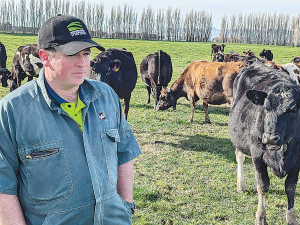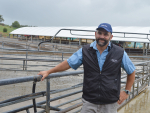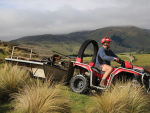Dean was given the title at the Feds' annual awards night, held as part of the Primary Industry New Zealand Summit in early July.
It is a recognition of the work Dean has put in as a public face of farming, putting farmers' concerns out to the wider populace.
"I was probably in the media too much, to be honest," he quipped.
Speakng from his dairy farm near Leeston and the shores of Waihora/Lake Ellesmere, Dean said that being close to Christchurch meant he fielde a lot of media calls, film crews and so on.
It was a matter of always putting the brand out, fighting for, and being a voice for, farmers.
Previously the dairy chair for the province, he has been North Canterbury president for about 18 months.
Dean says his predecessors all told him the job would be about 10 hours a week but it could take an entire week at a time.
"In this province, we have five district councils and one regional council. So, we've got quite a lot of territorial authorities that we've got to communicate with.
"When they did the long-term plans, we all had to review them and put in submissions,
"It's the Federation staff that do the majority of the work on that, but the provinical presidents and the other members of the exec still have to be there to be the farmers' voice."
For Canterbury farmers, Dean sees regional council freshwater plan changes as an urgent issue, since ECan is currently required by law to be developing a new regional policy statement for freshwater when the new Government has told them new guidelines are on the way.
"That's going to be the biggest headache for farmers in the next 12 months, trying to get the councils just to slow down.
"Just wait to get some more clarification on what the change is going to be by central government, so that we don't end up with rules that aren't fit for purpose.
"It's a hard thing, because the regional councils are mandated to do what they're currently doing and central government hasn't said to them, 'here is something new to work on'. So until there's something new to replace what they're currently doing, they can't legally stop.
"But hopefully we can slow them down enough until the central government comes up with a new solution."
Dean says Canterbury's existing water plan has been in place for about a decade and is delivering results.
"We don't really need to change it, we just need to modify it slightly."
Unfortunately, councils were still having to work towards unrealistic targets mandated by the previous government. Farmers at the bottom of catchments shouldn't be required to aim for better quality water than was going in at the top, he said.
Farmers should be supported to innovate instead of bogging them down with costly rules, regulations and reporting.
"If you spend a hundred thousand dollars on doing farm environment plans and resource consents to farm, that's a lot of money that you can't be spending on mitigating factors and plantings etc to actually improve the environment," he said.
Dean says that over the last 40 years, farmers have improved efficiency about 1% a year, so in theory should reduce emissions intensity by another 10% over the next 10 years.
However, New Zealand cannot sacrifice food production just to meet emissions targets.
"I think the biggest hurdles going forward are going to be that emissions discussion and just how we, hopefully, will move from looking at pricing emissions to look at how we're going to adapt to a changing climate.
"What things do farmers need to do to be more efficient, more profitable and how can the science back that up?
"We need to act on the whole global scale and say, we're helping produce good low emissions food for everyone in the world - versus countries that aren't."
Poor Returns A Major Worry
The return on investment is another major issue, according to Karl Dean.
"The dairy price is okay but it's not flash. It's not great in the lamb sector now. And obviously arable and beef all follow the same trend.
"Our costs have all gone up the last few years, but the price hasn't really gone up by the same amount."
Dean and his wife Amie are 50:50 sharemilkers on the property, where they have been for the past five years.
They have 400 cows on 200ha, fully self-contained, with all wintering on the platform and "pretty much nothing" leaving for wintering or grazing.
Another 130ha leased nearby is used for sheep, cropping and some beef.
The Deans employ one full-time herd manager with primary responsibility for the dairy side while they focus on the sheep and beef and cropping operations. A second hire comes onboard for the peak season, October to March.
One big recent innovation is Halter collars on the dairy herd which allows break feeding without manually shifting electric fences.
Dean says farm area rather than herd size is an important factor, so on a farm of about 300ha, the Halter system takes the place of about one and a half extra labour units.
He says the cows - a mixture of Friesian, Ayrshire and Jersey crossbreeds - are well trained to understand the cues.
"It takes about a week. Each year they seem to learn a little bit faster."


















